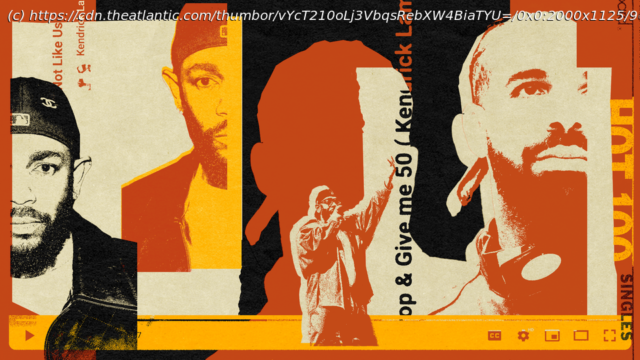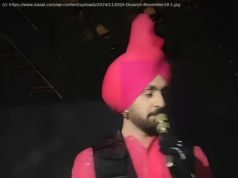This is no mere beef but a public humiliation ritual—and a referendum on the purpose of rap itself.
Scapegoating is one of humankind’s primal rituals, dating back to the Book of Leviticus, in which God commanded the prophet Aaron to lay hands on a goat, confess the sins of his tribe, and then send the animal into the desert. Throughout centuries and across cultures, the historian René Girard once argued, warring factions have settled disputes by agreeing upon a figure to collectively blame—a resolution that is ugly and unfair but, more than anything, cathartic.
The conflict was sparked by what now seems like a quaint dispute: Who’s the greatest rapper? A verse by J. Cole on a Drake song last fall postulated himself, Drake, and Lamar as hip-hop’s “big three.” Earlier this year, Lamar replied with a correction: “It’s just big me,” he rapped in a tone of seething hostility. Cole issued and quickly retracted a reply, but Drake took Lamar’s bait, and the two men began volleying diss tracks. Over eight songs—plus one interlude!—in less than a month, the question of who’s a better rapper has given way to a more profound debate about hip-hop, masculinity, and nothing less than the nature of evil.
This global audience has long been primed for the showdown. Since the early 2010s, Drake and Lamar have reigned as the yin and yang of popular rap: the entertainer and the artist, the hedonist and the monk. Drake has flooded the marketplace with hits, collaborations, and tie-in products. His sound is chameleonic, borrowing unapologetically from far-flung subgenres and scenes, and his lyrical outlook is pettily, proudly self-interested. Lamar, by contrast, expresses himself in carefully honed albums exploring how to live ethically in a fallen world. The Compton native’s music, for all its experimental edge, roots itself in the bounce and attitude of West Coast hip-hop. These two men have long been in a cold war, trading covert lyrical insults that fit with the ideological and aesthetic clash they both seem to represent.
So when Lamar rapped, “I hate the way that you walk, the way that you talk, I hate the way that you dress” on last week’s diss track “Euphoria,” he was harvesting from richly tilled soil. The hatred he spoke of was both visceral and intellectual; the song argued that the mixed-race Drake was insufficiently Black, or at least exploitative and cringey in his performance of Blackness. “It’s not just me,” Lamar rapped, referring to his distaste for Drake and the people he surrounds himself with.






